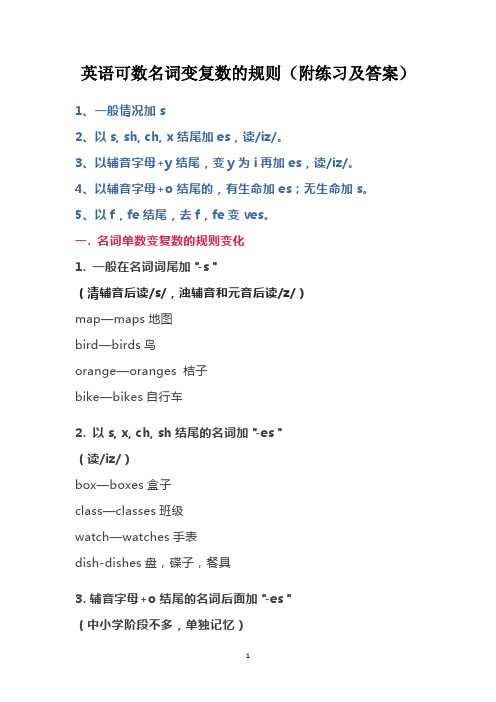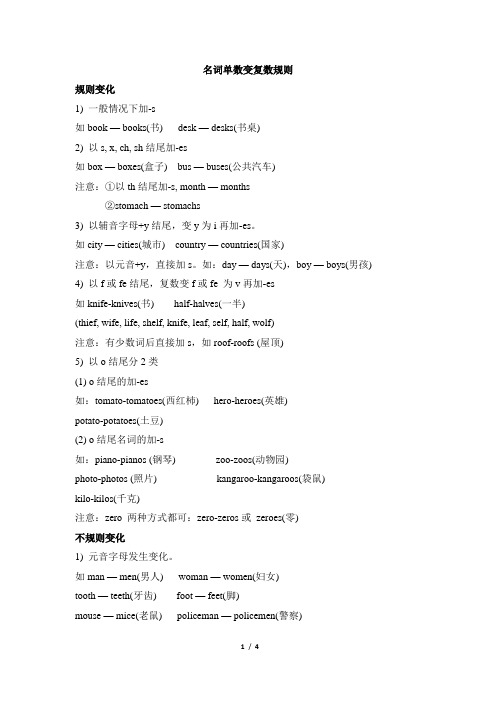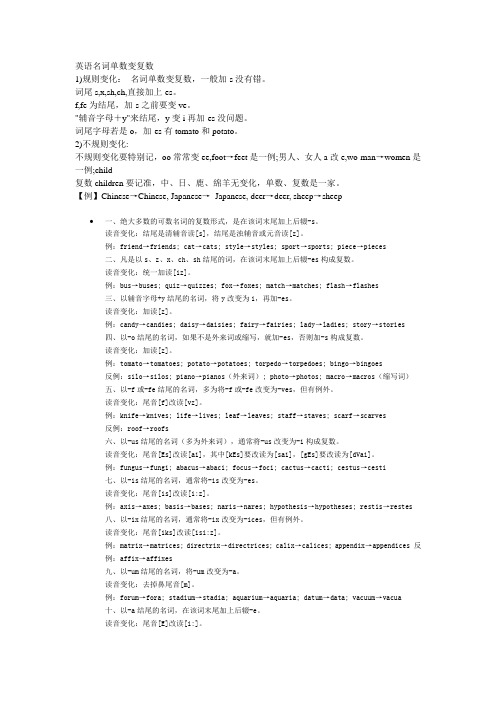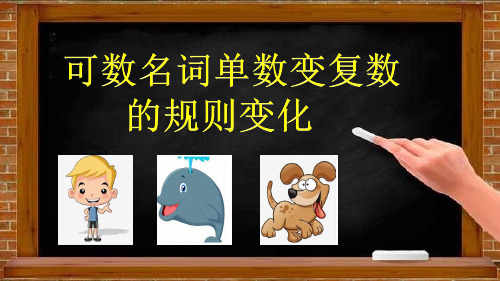英语名词单数变复数表格
英语名词变复数大全

1)单数名词加s: students, apples, bags, trees, books, rothers.2)以s、x、sh、ch结尾的名词加es: glasses, boxes, brushes, matches.3)以辅音字母加y结尾的名词,变y为i加es: cities, babies, enemies.4)以f或fe结尾的名词,多数变f为v加es: wives, knives.但有些词只加s: roofs, proof s, chiefs.5)以o结尾的名词,有些加es: Negroes, heroes, tomatoes, potatoes.其它加s: radio s, zoos, pianos, photos.6)不规则名词:foot→feet, goose→geese, tooth→teeth,child→children, man→me n, woman→women,sheep→sheep, deer→deer, mouse→mice.7)某些外来词变复数:datum→data, medium→media, bacterium→bacteria, curriculum→curricula,criterion→criteria, phenomenon→phenomena.(um/on→a)analysis→analyses, basis→bases,crisis→crises, diagnosis→diagnoses.(is→es )8)复合名词变复数:以不可数名词结尾的复合名词无复数形式,如:homework.以man或woman为前缀的复合名词变复数,前后两个名词都变复数,如:manservant→menservants, w oman student women students.其它复合名词变复数:grown up→grown ups,brother in law→brothers in law,stand by→stands by.9)复合形容词做定语时,其中的名词保持单数:a six year old boy,a two hundred page book名词复数英语中名词可分为可数名词和不可数名词。
英语可数名词变复数的规则(附练习及答案)

英语可数名词变复数的规则(附练习及答案)1、一般情况加s2、以s, sh, ch, x结尾加es,读/iz/。
3、以辅音字母+y结尾,变y为i再加es,读/iz/。
4、以辅音字母+o结尾的,有生命加es;无生命加s。
5、以f,fe结尾,去f,fe变ves。
一. 名词单数变复数的规则变化1. 一般在名词词尾加"-s"(清辅音后读/s/,浊辅音和元音后读/z/)map—maps地图bird—birds鸟orange—oranges 桔子bike—bikes自行车2. 以s, x, ch, sh结尾的名词加"-es"(读/iz/)box—boxes盒子class—classes班级watch—watches手表dish-dishes盘,碟子,餐具3. 辅音字母+o结尾的名词后面加"-es"(中小学阶段不多,单独记忆)tomato—tomatoes西红柿potato—potatoes土豆hero—heroes英雄negro—negroes黑人辅音字母+o结尾的名词后面加"-s"(一般为外来词或者缩写词)photo—photos相片kilo—kilos千克元音字母+o结尾的名词后面加"s" radio—radios收音机zoo—zoos动物园4. 以辅音字母加y结尾的名词,变y为i加"-es " baby—babies婴儿family—families家庭party—parties聚会以元音字母加y结尾的名词直接加"-s" boy—boys男孩toy—toys 玩具5. 以fe或f结尾的名词,把fe或f变为v加"-es"(读/vz/,数量不多,单独记忆)knife—knives小刀wife—wives妻子leaf—leaves树叶直接加-sroof—roofs房顶proof—proofs证据chief—chiefs首领两种都可以handkechief手绢—handkerchiefs / handkerchieves二. 名词单数变复数的不规则变化1. child—children 孩子foot—feet 脚tooth—teeth 牙齿mouse—mice 老鼠man—men 男人woman—women 女人注意:与man 和woman构成的合成词,其复数形式也是-men 和-women,例如:an Englishman—two Englishmen 但German不是合成词,故复数形式为Germans;Bowman是姓,其复数是the Bowmans(鲍曼一家)。
英语名词单数变复数规则及练习小学

可数名词变复数形式的规则1一般情况(包括元音字母+y结尾的单词),在词尾加-s.d esk---d esks 书桌girl---girls 女孩boy---boys男孩pen---pens钢笔2以-s,-x,-ch,-sh 结尾的词,在词尾加--esbus---buses公交车box--boxes箱子brush--brushes刷子watch--watch手表3以辅音字母加-y结尾的词,变y为i,加-esbaby-babies 婴儿family--families家庭4以-f或-fe结尾的词,变f或fe为v,再加-esknife---knives刀l eaf---l eaves树叶5以辅音字母加-o结尾的词,一般情况(有生命)下,在词尾加-estomato---tomatoes西红柿potato--potatoes马铃薯6可数名词变为复数形式的不规则变化如下:foot---feet脚mouse---mice老鼠goose---geese鹅fish---fish鱼ox---oxen公牛man---men男人woman---women女人child---children孩子Chinese--Chinese中国人d eer---d eer鹿sheep---sheep绵羊同步练习题1.选择填空( )1.I can see three ________ in the zoo.A monkeysB monkeyesC monkey( )2.The pig has four ______. A. foot B. feet C. foots( )3.My two brothers are both ______.A. policemanB. policemansC. policemen( )4.I can see ten _____ in the picture. A. sheep B. dog C. pig ( )5.The _____ has three______.A. boys, watchesB. boy, watchC. boy, watches( )6.Can you see _______on the plate? A. bread B. breads C. breades ( )7.The girl often brushes her_____ before she goes to bed.A. toothB. toothsC. teeth( )8.Mr Black often drink some _________.A. milk B. milks kes ( )9.There are some _____on the floor. A. child B. water C. books ( )10..Lucy will show us some new ____ of hers.A. photoB. photosC. photoes( )11. I drank two ______.A. bottles of waterB. bottle of waterC. bottles of waters( )12.The cat eats two _____last night.A. mousesB. miceC. mouse( )13.I need a pen and some _____. A. books B. desk C. chair ( )14、There on the wall .They are very beautiful.A. are photoesB. are photosC. is a photoD. is photos ( )15. There some in the river.A. is ,fishB. are, fishsC. is, fishsD. are ,fish( )16. There two in the box.A. is watchB. are watchesC. are watchD. is watches( )17. We should clean twice a day.A .our tooth B. our tooths C.teeth D.our teeth( )18.Our _____ room is near the reading room.A.teacherB.teacher’sC.teachers( )19.Tom and Jim are ___.A:friends B:friend C:brother D:sister( )20.How many_____do they have?A:picture B: pictures C:a picture三、用所给的单词的复数的正确形式填空:1> There are three ______(chair) in the classroom.2>These _______(tomato) are red.3>My brother looks after two ______(baby)4> My father likes to eat _______(potato).5>Chinese ______(people)like to eat noodles.6>I have a lot of ______(toy) in my bedroom.7>I help my mother wash ______(dish) in the kitchen.8>I have two ______(pencil-box).9>There are some ______(bus)in the street.10>Peter has eight _____(foot).11>Linda has three _______(tooth).12>There are some ______(child) in the garden.13>My uncle and father are _____(man).14>Tom and King are _____(boy).。
初中英语名词变复数,动词的单数第三人称形式、现在分词、过去分词,形容词、副词的比较级和最高级变化规律。

词尾变化规则总表:名复单三现形过词尾情况名(词)复(数) 单三现(分) 形(副等级) 过(式,分) 一般+s +s +ing +er, est +eds,x,sh,ch +es +es 同上同上同上e +s +s 哑e 去,+ing +r, st +d单元音+1个辅音ⅹⅹ双写词尾+ing 双写词尾+er, est 双写词尾+ed 辅+y y—i,+es y---i,+es ⅹy---i,+er(est) y---i,+edmore, most +…..名复单三不双写现分没有y变i 形过变化样样有词尾变化规则总表:名复单三现形过词尾情况名(词)复(数) 单三现(分) 形(副等级) 过(式,分)1、一般+scat month ticket KoreanAmerican Australian IndianRussian Canadian ItalianGerman JewEuropean human boymonkey day way keyphoto piano radio zookilo mango(少用)+sopenlistencleanplaystaysay+inggo study seeopen fix openlisten cleansneeze (打喷嚏)see+er, esthard quick cold clever new narrow sourround smart loud mean stupid wild dullquiet black warm sick bright cool nearweak bald young straight tall short longcalm deep cheap strong high slow darkgreat blind dumb deaf full poor real fewgray polite(少用) often(2)+edplay help open stay fix cleanlisten finish borrow join returnpour perform rain work checkwait pick laugh mix end fear callhappen fail fold answer returnlook talk plant annoy knockreview hang(绞死)2、 e e +s e +shopecome哑e 去,+inglive come writetake havee +r, stfine free close nice able white blondesore true large safe handsome lame truesure cute(2种)e +dskate love like dance changepractice close die live receiveretire advice argue hate smileexchange smoke agree lie (说谎)sneeze打喷嚏3、单元音+ 1个辅音名复单三不双写双写词尾+ingsit begin shoprun forget planhit put set clapstar主演hiccup打嗝双写词尾+er, estred big hot thin fat sad slim flat mad双写词尾+edstop plan fit drop shop chat(聊天)trip(绊倒)kid (欺骗)star 主演hiccup打嗝4、辅+y,y—i y—i,+escity factory country babyfamily library dictionaryy---i,+escarrystudy现分没有y变i y---i,+er(est)easy happy healthy early busy ugly curlyfunny scary pretty angry cloudy sunnyrainy windy lovely friendly unfriendlyunhappy unlucky furry tiny guilty greedyheavy moody lively thirsty lazy hungrysorry empty crazy silly pushy luckyshy(2种)y---i,+edstudy cry marry carry worry5、s,x,sh,ch,o+esglass box watch dishwish busnegro hero potatotomato mango+escatchwatchfixbrushgo do名词变复数不规则变化f,fe---v+es thief—thieves (小偷)self—selves(自己)leaf—leaves(叶子) life---lives (命)half---halves;(一半)wife---wives (妻子)shelf—shelves(架)knife---knives(刀)wolf—wolves(狼)roof—roofs(屋顶)chef—chefs(厨师) scarf—scarfs,scarves( 围巾) 词形不变Chinese Japanese sheep deer Swiss 中日羊鹿瑞士人变成e man---men Englishman---Englishmen Frenchman---Frenchmen foot---feet tooth---teeth只有复数clothes pants trousers shorts scissors (剪刀)compasses (圆规) glasses(眼镜)形复实单news maths politics physics形单实复cattle people police 谓语用复数特殊变化child---children mouse--mice合成名词只变一词boy student---boy students night school---night schools pencil sharpener-- sharpeners 两词都变woman doctor---women doctors man singer---men singers动词的现在分词形式不规则变化词尾情况规则例词ie ie----y,+ing die tie lie 形容词、副词的比较级、最高级形式不规则变化不规则变化多数多音节词more,most+原级useful famous quickly beautiful creative serious outgoing amazing awful exciting excited interested famous intelligentexpensive inexpensive tired honest wonderful interesting fantastic sadly beautifully delicious slowly open difficult carefullybeautifully deeply careless active athletic original foolish wrong right casual casually nervous unusual usual modest naturalpleased realistic popular loving inexpensive comfortable convenient crowded truly exhausted embarrassed convincing carelesscareful carefully enormous completely particularly quickly quietly aggressive specifically disappointed disgusted successfulsuitable educational gradually unpleasant pleasant polite(2种) common(2种)原级比较级最高级词义good/well better bestbad/ill worse worstmany/much more mostlittle less leastfar farther farthest 距离further furthest 程度late later latest 时间latter last 顺序old older oldest 年龄关系elder eldest 兄弟姐妹关系GO FOR IT PT PPmeaning root form pt pp meaning root form pt pp让允许let let let 喂feed fed fed阅读read read read 遇见meet met met放置put put put 感觉feel felt felt花费cost cost cost 嗅,发出smell smelt smelt打hit hit hit 拼写spell spelt spelt砍切割cut cut cut 损坏,宠坏spoil spoilt spoilt伤害弄伤hurt hurt hurt 发现,找到 find found found撒抛投cast cast cast 举着,握着hold held held关闭 shut shut shut 听见hear heard heard沉入安置set set set 有,吃have/has had had传播展开spread spread spread 丢失,失去lose lost lost使阴暗overcast overcast overcast 离开,留下leave left left广播broadcast broadcast broadcast 制造,使得make made made预测forecast forecast forecast 射击射伤shoot shot shot爆炸burst burst burst 照耀发光shine shone shone捕捉赶上catch caught caught 坐sit sat sat教书教学teach taught taught 临时照顾babysit babysat babysat 想认为think thought thought 吐,吐唾液spit spat spat买buy bought bought 打赢,获胜win won won搜寻追求seek sought sought 出血bleed bled bled打架打仗fight fought fought 逃跑flee fled fled带来bring brought brought 改建rebuild rebuilt rebuilt 扫sweep swept swept 睡过头oversleep overslept overslept 哭泣流泪weep wept wept 挖dig dug dug保持keep kept kept 撒谎lie lied lied睡觉sleep slept slept 放置下蛋lay laid laid梦到,做梦dream dreamt dreamt 躺lie lay lain学习,学会learn learnt learnt 敲打,振翅beat beat beaten 燃烧burn burnt burnt 编织weave wove woven 建设build built built 上升,升起rise rose risen弯曲,弯腰bend bent bent 发生,呈现arise arose arisen花费,度过spend spent spent 驱使驱赶drive drove driven 发送,派遣send sent sent 拿走,带走take took taken付钱pay paid paid 误认为mistake mistook mistaken 说say said said 摇动挥动shake shook shaken 站立stand stood stood 刮风,吹blow blew blown明白understand understood understood 生长,种植grow grew grown 误解misunderstand misunderstood misunderstood 知道,了解know knew known 卖sell sold sold 画,拖,拉draw drew drawn给give gave given 投掷抛throw threw thrown 原谅forgive forgave forgiven 飞行fly flew flown告诉tell told told 展示show showed shown 处置,对付deal dealt dealt 看见,看望see saw seen7下不规则动词的过去式汉语1 A-A 必让放读花打砍伤2 –ew 画长知扔示飞3-ought 想来买4-aught 教抓5 –o- 断忘说动词原形1 A--Amustletputreadcosthitcuthurt2 –ewdrawgrowknowthrowshowfly3 –oughtthinkbringbuy4 –-aughtteachcatch5 -o--breakforgetspeak过去式1 A—Amustletputread[♏]costhitcuthurt2 –ew[◆:]drewgrewknewthrewshowedflew3 –ought[ :]thoughtbroughtbought4-aught[[ :]taughtcaught5 –o—[☯☺]brokeforgotspoke写拿卖诉弄骑开站懂6 –e—留见意睡离握扫感落喂7 –-a--始喝跑唱游给坐writetakeselltellgetridedrivestandunderstand6–e—keepmeetmeansleepleaveholdsweepfeelfallfeed7 –-a--begindrinkrunsingswimgivesitwrotetooksoldtoldgotrodedrovestoodunderstood6 –e—[♏]keptmetmeantsleptleftheldsweptfeltfellfed7 –-a--[✌]begandrankransangswamgave[♏✋]sat8 be动词是是是9 助动词可能将将做做10----t花建丢11其他来去生有有看听说吃找花躺8 be动词amisare9 助动词maycanwillshalldodoes10----tspendbuildlose11其他comegobearhavehasseehearsayeatfindpaylie8 be动词waswaswere9 助动词mightcouldwouldshoulddiddid10----tspentbuiltlost[ ]11其他camewentbore [ :]hadhadsawheardsaidatefound[ ☺]paidlay GO FOR IT PT PP (八下常用)meaning root form pt pp meaning root form pt pp让允许let let let 到达get got got阅读read read read 绞死hang hanged hanged 放置put put put 悬挂hang hung hung 花费cost cost cost 照亮light lit lit打hit hit hit 撒谎lie lied lied砍切割cut cut cut 躺lie lay lain伤害弄伤hurt hurt hurt 下蛋lay laid laid沉入安置set set set 敲打beat beat beaten 关闭 shut shut shut 来come came come 抓catch caught caught 成为become became become 教teach taught taught 跑run ran run认为think thought thought 给give gave given 买buy bought bought 驾驶drive drove driven 打架fight fought fought 拿走take took taken规则与不规则的动词过去式、过去分词(八下常用)leave lie(说谎) like make lie mistake sit lay shake become beat berun come let give swim read hurt put love set blow cost shut drive hit grow take cut know catch fall think teach eat buy die get。
人教版PEP英语四年级下册语法知识:名词单数变复数规则-新版

名词单数变复数规则规则变化1) 一般情况下加-s如book — books(书) desk — desks(书桌)2) 以s, x, ch, sh结尾加-es如box — boxes(盒子) bus — buses(公共汽车)注意:①以th结尾加-s, month — months②stomach — stomachs3) 以辅音字母+y结尾,变y为i再加-es。
如city — cities(城市) country — countries(国家)注意:以元音+y,直接加s。
如:day — days(天),boy — boys(男孩) 4) 以f或fe结尾,复数变f或fe 为v再加-es如knife-knives(书) half-halves(一半)(thief, wife, life, shelf, knife, leaf, self, half, wolf)注意:有少数词后直接加s,如roof-roofs (屋顶)5) 以o结尾分2类(1) o结尾的加-es如:tomato-tomatoes(西红杮) hero-heroes(英雄)potato-potatoes(土豆)(2) o结尾名词的加-s如:piano-pianos (钢琴) zoo-zoos(动物园)photo-photos (照片) kangaroo-kangaroos(袋鼠)kilo-kilos(千克)注意:zero 两种方式都可:zero-zeros或zeroes(零)不规则变化1) 元音字母发生变化。
如man — men(男人) woman — women(妇女)tooth — teeth(牙齿) foot — feet(脚)mouse — mice(老鼠) policeman — policemen(警察)policewoman — policewomen(女警察)2) 词尾发生变化。
如child — children(小孩) ox — oxen(公牛)3) 单、复数形式相同。
英语名词单数变复数

英语名词单数变复数1)规则变化:名词单数变复数,一般加-s没有错。
词尾s,x,sh,ch,直接加上-es。
f,fe为结尾,加-s之前要变ve。
"辅音字母+y"来结尾,y变i再加-es没问题。
词尾字母若是o,加-es有tomato和potato。
2)不规则变化:不规则变化要特别记,oo常常变ee,foot→feet是一例;男人、女人a改e,wo-man→women是一例;child复数children要记准,中、日、鹿、绵羊无变化,单数、复数是一家。
【例】Chinese→Chinese, Japanese→Japanese, deer→deer, sheep→sheep一、绝大多数的可数名词的复数形式,是在该词末尾加上后辍-s。
读音变化:结尾是清辅音读[s],结尾是浊辅音或元音读[z]。
例:friend→friends; cat→cats; style→styles; sport→sports; piece→pieces二、凡是以s、z、x、ch、sh结尾的词,在该词末尾加上后辍-es构成复数。
读音变化:统一加读[iz]。
例:bus→buses; quiz→quizzes; fox→foxes; match→matches; flash→flashes三、以辅音字母+y结尾的名词,将y改变为i,再加-es。
读音变化:加读[z]。
例:candy→candies; daisy→daisies; fairy→fairies; lady→ladies; story→stories四、以-o结尾的名词,如果不是外来词或缩写,就加-es,否则加-s构成复数。
读音变化:加读[z]。
例:tomato→tomatoes; potato→potatoes; torpedo→torpedoes; bingo→bingoes反例:silo→silos; piano→pianos(外来词); photo→photos; macro→macros(缩写词)五、以-f或-fe结尾的名词,多为将-f或-fe改变为-ves,但有例外。
英语单复数变化规则表

英语单复数变化规则表名词单数变复数的规则变化1. 一般在名词词尾加"-s"map—maps地图bird—birds鸟orange—oranges 桔子bike—bikes自行车2. 以s, x, ch, sh结尾的名词加"-es" box—boxes盒子class—classes班级watch—watches手表dish-dishes盘,碟子,餐具3. 以o结尾的无生命的名词后面加"-s" photo—photos相片radio—radios收音机zoo—zoos动物园以o结尾的有生命的名词后面加"-es"tomato—tomatoes西红柿potato—potatoes土豆hero—heroes英雄negro—negroes黑人4. 以辅音字母加y结尾的名词,变y为i加"-es " baby—babies婴儿family—families家庭以元音字母加y结尾的名词直接加"-s"boy—boys男孩toy—toys 玩具5. 以fe或f结尾的名词,把fe或f变为v加"-es" knife—knives小刀wife—wives妻子leaf—leaves树叶名词单数变复数的不规则变化1. child—childrenfoot—feettooth—teethmouse—miceman—menwoman—women注意:与 man 和 woman构成的合成词,其复数形式也是 -men 和-women,例如: an Englishman—two Englishmen 但German不是合成词,故复数形式为Germans;Bowman是姓,其复数是the Bowmans(鲍曼一家)。
2. 单复数同形的名词例如: deer鹿,sheep绵羊,fish鱼,Chinese中国人,Japanese日本人注意:除人民币元、角、分外,美元、英镑、法郎等都有复数形式。
英语名词单数变复数-2022年学习材料

2.把下面的单数句子变成复数句子-1-This is a book.-These are books-It is a red apple.-They_are red apples-3-That is a erase .-Those-are erasers
3.填入所给名词的正确形式。-1I have two knives knife-2There are ma y boxes _box-3She has three rulers ruler
3.以0结尾的名词,有的加-S,有-的加-es构成复数形式。-photo-photos-Z00--Z00S 动物园-tomato一tomatoes-西红柿-hero-heroes-英雄
以0结尾的名词-表示无生命事物的名词,词尾加-S,-表示有生命事物的名词,词尾加-es。-加-es的名词有 -hero,potato,tomato,-巧记:-英雄爱吃-土豆炖西红柿。
name-→-hames-pen--pens-bed-beds-ruler -rulers
2.以s,X,ch,Sh等结尾的名词,-在词尾加-es构成复数形式。-class classes-boxoxes-watch-watches
bus一buses-fox-一foxes-狐狸-dish dishes-盘子
名词单数变复数练习题-1.请把下面的名词单数变复数-cat S-dog S-desk S-key S-bo S-storystories-familyfamilies bus es-box es-watch es potato es-tomato-knife knives-teacher S-sister S-plan S_-school s peach es
Sum up:-1.一般情况下,直接在名词词尾加-S.-2.以s,x,Sh,ch结尾的名词,在词尾加-es -3.以辅音字母加y结尾的名词,要变y为i再加-es.-4.以“元音字母+y”结尾的名词,直接在词尾加-S 5.以f或fe结尾的名词,先将f或fe变为v,再加-es.-6.以o结尾的名词,表示无生命事物的名词加-s -表示有生命事物的名词加-es。-7.以o0结尾的名词变为复数时,词加-s
小学阶段英语名词单数变复数总结

英语名词单数变复数归纳一、规则名词的复数形式:名词的复数形式,一般在单数形式后面加-s或-es。
具体如下:1 、一般情况在词尾加-s:如;map-maps, sea-seas, girl-girls, day-days2 、以s, x, ch, sh结尾的名词后加-es:如:class-classes, box-boxes, watch-watches(手表), dish-dishes(盘子), bus-buses3 、以-f或-fe结尾的词,变-f和-fe为v再加-es:如:leaf-leaves, thief-thieves(小偷,强盗), knife-knives, wolf-wolves(狼), wife-wives,self-selves(自己), shelf-shelves(书架,架子),half-halves(一半) life-lives(生命);歌谣:树叶半数自已黄妻拿刀割粮架窜狼像强盗逃命忙。
加-s:belief-beliefs(信仰), chief-chiefs(首领), proof-proofs(证据), roof-roofs(房顶), gulf-gulfs(海湾), handkerchief-handkerchieves(手帕)歌谣:海湾边、屋顶首领奴仆两相望;谁说信仰证据写手帕4 、以辅音字母加y结尾的名词,变y为i加-es :如:party-parties, family-families, story-stories, city-cities5 、以元音字母加y结尾的名词,或专有名词以y结尾的,加-s如:toy-toys, boy-boys, day-days, ray-rays, Henry-Henrys6、以辅音字母加-o结尾的名词一般加-es:如:hero-heroes, Negro-Negroes, potato-potatoes, tomato-tomatoes;黑人英雄爱吃土豆和西红柿。
(完整版)英语单词单数变复数规则

单词单数变复数规则1)单数名词加s: students, apples, bags, trees, books, brothers.2)以s、x、sh、ch结尾的名词加es: glasses, boxes, brushes, matches.3)以辅音字母加y结尾的名词,变y为i加es: cities, babies, enemies.4)以f或fe结尾的名词,多数变f为v加es: wives, knives.但有些词只加s: roofs, proof s, chiefs.5)以o结尾的名词,有些加es: Negroes, heroes, tomatoes, potatoes.其它加s: radio s, zoos, pianos, photos.6)不规则名词:foot→feet, goose→geese, tooth→teeth, child→children, man→me n, woman→women, sheep→sheep, deer→deer, mouse→mice.7)某些外来词变复数:datum→data, medium→media, bacterium→bacteria, curriculum→curricula, criterion→criteria, phenomenon→phenomena. (um/on→a)analysis→analyses, basis→bases, crisis→crises, diagnosis→diagnoses.(is→es )8)复合名词变复数:以不可数名词结尾的复合名词无复数形式,如:homework.以man或woman为前缀的复合名词变复数,前后两个名词都变复数,如:manservant→menservants, woman student women students.其它复合名词变复数:grown up→grown ups, brother in law→brothers in law, stand by→stands by.9)复合形容词做定语时,其中的名词保持单数:a six-year old boy,a two hundred page book。
英语语法名词单数变复数PPT课件

句型转换
1.What’s this ? 复数 What’re these ?
2.He’s a Chinese boy. 复数 They’re Chinese boys.
3.This is a bike. 否定句 This is not a bike. 复数句 These are bikes.
一般疑问句,并作肯定回答
Is this a bike ? Yes, it is.
4.That is my brother. 否定句
That is not my brother.
一般疑问句,并作否定回答
Is that your brother ? No, it / he isn’t.
5.These are dictionaries.
名词单数变复数
--What’s t-h-iIst’? s a pen.
--What are t-h-eTshee?y are
pens.
--What’s that? --It’s an English book.
--What are those?
--They are English books.
bags
单数
This is a
一d般ic疑ti问on句ary,.并作肯定回答
Are these
dictionaries ? Yes,
划th线ey提a问re.What are these ?
SUCCESS
THANK YOU
2019/6/25
shelf (架子) leaf (叶子) wolf (狼)
6. oo
ee: foot(脚) tooth(牙齿)
名词单数变复数后s / es 的读音
1.在清辅音后读 / s /desks maps 2.在元音和浊辅音后读 / z /bpreontshers 3.在/ s / / z / /∫∫/ / / / t / /cldasse/s后, watches, oranges
你没见过的英语单词单数变复数

6.单复数同形的词等等。
规则这么多怎么记啊?千万别着急,先听几个故 事,故事讲完了你也就记住了。
第一类:
最长见的是在单词后面直接加s
听故事之前我们要知道字母s 代表蛇,因为 它的外形弯弯曲曲和蛇非常像。
Hello,大家好!今天要 为大家讲述的是英语名 词单数变复数的方法。
主讲人——Hunter
单数变复数规则:
1.最长见的是在单词后面直接加s
2.s,x,ch,sh,后面要加es。 o(有些情况加es,有些情 况直接加s就可以)
3.遇见以y结尾并且y前面是辅音的情况要把y变成ie再加s, 如果前面是元音的话直接加s。
口诀总结:以o结尾加s的单词
动物园(zoo)里收(radio)钢(piano) 片(photo),袋鼠(kangaroo)竹子 (bamboo)蛇(s)出现。 以o结尾加es的单词
黑(negro)土(potato)吃红(tomato)果 (mango),英雄(hero)山(volcano)上坐。
第三类:
story7
中国人(Chinese)和日本人(Japanese)很团结,他 们即使只有一个人那也和很多人是一样的。鱼(fish)、 螃蟹(crab)、梅花鹿(deer)和绵羊(sheep)虽然 孤单,但是它们是好朋友,即使只有自己也像有很多同类 一样热闹。
口诀总结:
两个国家四动物,中日鱼蟹羊和鹿。
一句话总结这个几个单词:人人网 上 的老鼠用牙咬了孩子的脚
foot and child man and woman tooth
mouse
英语语法 可数名词单数变复数的几种变化

1. 直接在名词末尾加s desk-desks cap-caps
[desk]
[kæ p]
car-cars [kɑːr]
bag-bags [bæɡ]
cake- cakes [keɪk]
清辅音后读 [s]
浊辅音后读 [z]
可数名词单数变复数的规则变化
辅音部分(28个):
1、清辅音:[p]、[t]、[k]、[f]、[s]、[θ]、[tr]、 [ts]、[ʃ]、[tʃ]、[h]
2、浊辅音: [b]、[d]、[g]、[v]、[、[dz]、[dr]、[j]、[w]、[m]、[n]、[ŋ]、[l]
可数名词单数变复数的规则变化
2.以s,x,sh,ch结尾的加es
box-boxes
brush-brushes
match-matches bus-buses
5.以f或fe结尾的名词,变成复数有两种形式:
把f/fe改为v-es knife-knives刀
leaf-leaves 树叶
一个首领从悬崖上 跳到了屋顶上
wife -wives 妻子 half-halves 一半 life-lives 生命
有些直接加词尾-s,
chief/chiefs 首领 roof/roofs屋顶 cliff-cliffs悬崖
可数名词单数变复数的规则变化
4.以o结尾的名词,有些词尾-s,有些加-es。 读音: [z]
tomato- tomatoes 西红柿 Negro- Negroes 黑人
hero- heroes 英雄
potato-potatoes 土豆
英雄和黑人吃土豆和西红柿(变复数加es)
可数名词单数变复数的规则变化
(完整word版)英语名词单数变复数表格

leaf-leaves(树叶);
5
以y 结尾的,如果y前面是辅音,把y 改为i,再加-es,读[z];如果y前面是元音,直接加s,读[s].
辅音加y:story—storiescity-citiesfamily—families baby—babies
元音加y:boy—boystoy-toyskey—keys
4
以f、fe结尾的名词,变f、fe为v+es,读[iz]。口诀:妻子持刀去宰狼,小偷吓得发了慌,躲在架后保己命,半片树叶遮目光
wife—wives(妻子); knife-knives(小刀); wolf—wolves(狼); thief—thieves(小偷);shelf—shelves (架子);life-lives(生命、生活);
6
有些名词有不规则的复数形式
man-menwoman-womentooth—teeth(牙齿)foot—feetpoliceman-policemen mouse—mice 老鼠 child—childrenox—oxen 公牛
7
有些名词的单复数形式相同
deer—deer 鹿sheep—sheep绵羊
fish-fish鱼Japanese—JapaneseChinese-Chinese
8
有些学科名词虽以s 结尾,但通常都做单数名词看待
physics 物理maths 数学
politics 政治news 新闻
9
有些单数形式的名词具有复数的含义,要当作复数看待
people人们police 警察 public 公众
3
以o结尾的词有生命的+es,读[z]。口诀:英雄吃土豆、番茄和芒果;无生命的+s,读[s];以两个元音字母结尾(其一必定是o)时+es,读[z]。
- 1、下载文档前请自行甄别文档内容的完整性,平台不提供额外的编辑、内容补充、找答案等附加服务。
- 2、"仅部分预览"的文档,不可在线预览部分如存在完整性等问题,可反馈申请退款(可完整预览的文档不适用该条件!)。
- 3、如文档侵犯您的权益,请联系客服反馈,我们会尽快为您处理(人工客服工作时间:9:00-18:30)。
“S法则”:可数名词变复数的变化规则
英语的名词有可数名词与不可数名词之分。
我们判断一个名词是可数与不可数是一个很重要的问题,因为它牵扯到在它的前面加不加冠词以及加哪种冠词,还有该词在句子当中适当的形式等问题。
那么,可数名词与不可数名词怎么区分呢?
一般来说,可数名词有单、复数之分。
像表示人或事物的名词和集体名词等一般都是可数的。
有时候,我们也可以在该词之前试着加一加基数词来进行判断。
一般能用基数词数的名词,通常是可数名词,例如:
a boy 一个男孩儿three boys 三个男孩儿some boys 一些男孩子
a desk 一张课桌40 desls 40张课桌many desks 很多课桌
a film 一部电影some films 几部电影
a story 一个故事two stories 两个故事
a song 一支歌some songs 几首歌曲
an apple 一个苹果9 apples 9个苹果some apples 一些苹果
people(复)人,人们police(总称)警务人员Chinese(单复同)中国人
物质名词或抽象名词一般都是不可数的。
不可数名词没有单数和复数的区别,例如:
water 水ice 冰tea 茶meat 肉milk 牛奶
age 年龄time 时间help 帮助luck 运气work 工作
有少数物质名词也有复数形式,不过它们的含义则有所不同了,例如:
glass 不可数名词玻璃glasses 可数名词眼镜
water 不可数名词水waters 可数名词某个河流、湖泊的水
顺便说一下,有些物质名词本身也是可数名词,但其含义也有所不同了。
例如:
物质名词可数名词
glass 玻璃a glass 玻璃杯
paper 纸张a paper 报纸;论文
wood 木头a wood 树林
gold 金子a gold 金牌
可数名词和不可数名词学起来似乎并不难,但是真正学好却并不容易,有不少单词只有查较好的词典才能弄清有关问题。
另外,平时看书学习也要多看、多记。
只有多积累,才能学好它。
